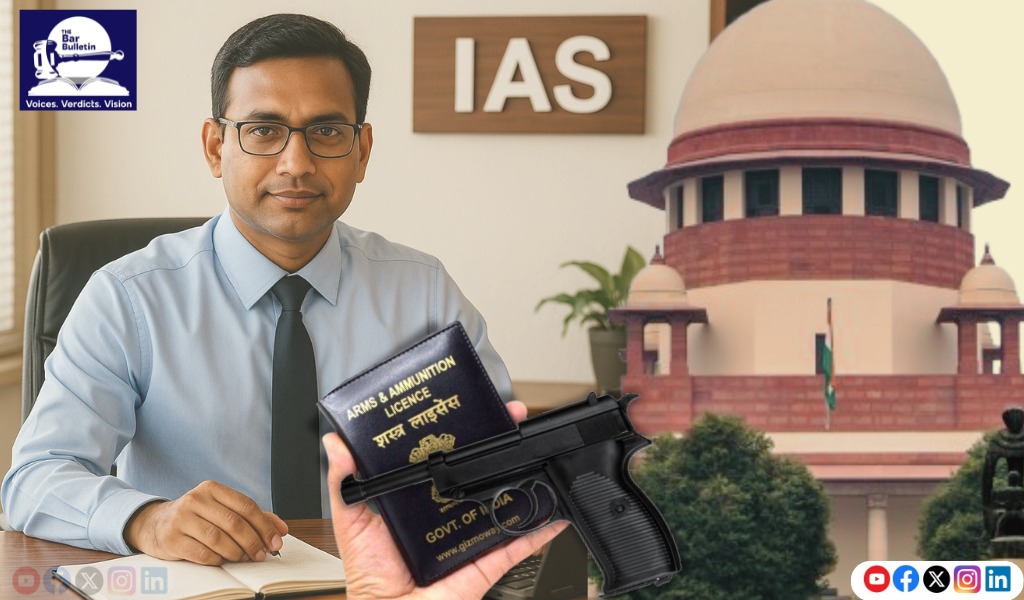The Supreme Court has set aside the criminal prosecution initiated against an IAS officer, who was accused of issuing arms licences without proper police verification nearly two decades ago. The Bench of Justice Sanjay Karol and Justice Nongmeikapam Kotiswar Singh quashed the cognizance order and held that the sanction granted by the Bihar Government u/s 197 of the CrPC was “vague”, “non-speaking”, and failed to demonstrate any application of mind, thereby rendering the prosecution unsustainable.
The case dates back to 2005, when a police officer lodged an FIR alleging that the District Magistrate of Saharsa, had issued arms licences to 7 persons, some allegedly fictitious, unverified, or physically unfit. Subsequent investigation initially cleared the officer in 2006, explicitly recording that the allegations against him were false. Despite this, the case was reopened in 2009 for “further investigation”, eventually culminating in a fresh chargesheet 11 years later, in 2020, without any new material. The State then granted prosecution sanction under Section 197 CrPC in 2022.
Against this order, the appellant approached the Patna High Court u/s 482 of the CrPC. However, the High Court had rejected the application under Section 482 CrPC, holding that various irregularities pervaded the issuance of arms licences during the appellant’s tenure as District Magistrate. The Court further ruled that discretion under Section 13(2A) of the Arms Act cannot be exercised in an arbitrary or unjust manner, and directed the Trial Court to proceed day-to-day, given the delay. This prompted the appellant to present this appeal before the Supreme Court.
The Supreme Court examined the sanction order in detail and found it to be a mere reproduction of allegations, based solely on “perusal of the case diary”, lacking any application of mind or satisfaction on the officer’s role, as mandated under law. The Court emphasised that a sanction must be a “solemn and sacrosanct act”, not a mechanical signature, and invalidated the sanction as legally defective.
The Court also highlighted the inordinate delay of over 11 years between initial investigation and chargesheet and further delay of 2 years, which, it held, was in clear violation of the right to speedy investigation and trial under Article 21. Reference was made to Abdul Rehman Antulay v. R.S. Nayak, (1992) 1 SCC 225, and P. Ramachandra Rao v. State of Karnataka, (2002) 4 SCC 578, Sovaran Singh Prajapati v. State of U.P., 2025 SCC OnLine SC 351, and CBI v. Mir Usman, 2025 SCC OnLine SC 2066.
Citing these cases, international jurisprudence, statutory provisions of the Police Act and the CrPC and the systemic expectation of prompt investigation, the Court observed that criminal proceedings cannot linger indefinitely, especially when earlier investigation had exonerated the officer.
Finding the prosecution to be tainted by defective sanction, excessive delay, and lack of fresh material, the Supreme Court quashed the cognizance order dated 1 June 2022 and all consequential proceedings against the IAS officer.
The Court has also issued the following four directions on judicial oversight of further investigation, delays in filing chargesheets, and the necessity of reasoned sanction orders.
- The Court held that in view of Vinay Tyagi v. Irshad Ali, (2013) 5 SCC 762 when leave of the court is granted to conduct further investigation under Section 173(8) CrPC, the court does not become functus officio. Judicial supervision continues, and since further investigation is undertaken with the court’s permission, the court must retain stewardship and control over that process.
- The Court emphasised that reasons are indispensable in criminal procedure. If the Court finds, or if the accused properly alleges with supporting material, that there is a substantial and unexplained gap between the FIR and the filing of the chargesheet, the Court is bound to seek an explanation from the investigating agency and satisfy itself of its propriety.
- While investigations may take time and involve many moving parts, they cannot continue indefinitely. If an investigation has gone on for an unduly long period without adequate justification, the accused or complainant may approach the High Court under Section 528 BNSS / Section 482 CrPC seeking an update or, where appropriate, quashing. Delay can be one ground, but if the Court entertains such an application, it must consider all relevant grounds.
- Reasons are equally crucial in administrative decisions, including the grant or refusal of a sanction. Authorities must demonstrate application of mind, and their reasoning must be visible from the sanction order, reflecting consideration of the evidence placed before them.
Appearances
Petitioner- Mr. Maninder Singh, Sr. Adv. Mr. Santosh Kumar, AOR Ms. Richa Singh, Adv. Mr. Abhishekh Tripathi, Adv. Mr. Shravanth Paruchuri, Adv.
Respondent- Mr. Manish Kumar, AOR Mr. Sivam Singh, Adv. Mr. Divyansh Mishra, Adv. Mr. Kumar Saurav, Adv. Mr. Ishwar Singh, Adv. Mr. Shubham Jhanghu, Adv. Mr. Yoshit Jain, Adv.



